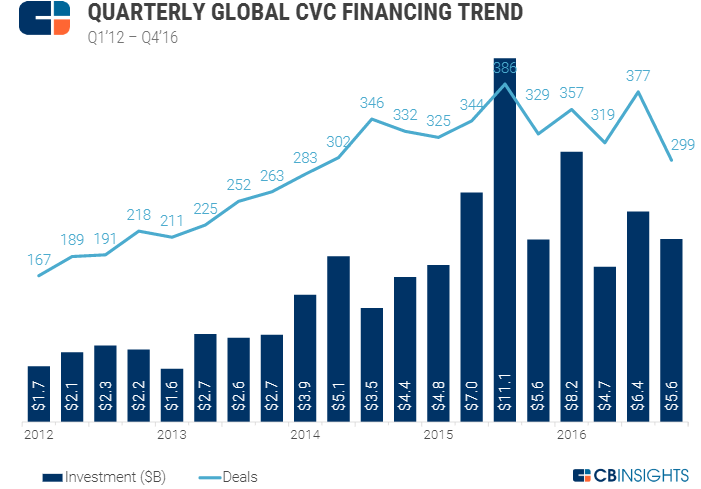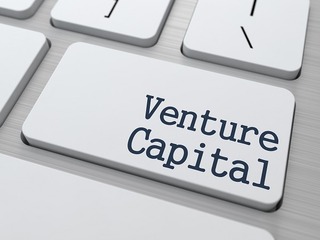

Editor’s note: Our Splash Health, Wellness and Wearables event is coming up on March 23 in San Francisco. We’ll have Mario Schlosser, Founder & CEO of Oscar Health, Brian Singerman (Partner, Founders Fund), Steve Jurvetson (Draper Fisher Jurvetson), J. Craig Venter (Human Longevity), Lynne Chou (Partner, Kleiner Perkins), Michael Dixon (Sequoia Capital), Patrick Chung (Xfund), Check out the full lineup and register for tickets before they jump! If you’re a healthcare startup and you’re interested in being part of our competition, learn more and register here.
There has been a big rise in the number of corporate venture capital arms in the last five years, with the number more than doubling from 2010 to 2015, going from only 124 to 321 of them. That’s an average increase of 15.5 percent year-over-year.
In 2016, the increase was even higher, with the number of newly formed CVCs growing at 20 percent globally, according to the Global Corporate Venture Capital Report from CB Insights, released on Wednesday.
In all 107 new corporate VC funds made their first investment in 2016. That’s the largest number of new funds, by far, in at least the last six year.
Interestingly, though, despite the uptick in new firms, investment activity was flat around the globe, and the United States, was either flat or down.
Year-to-year, global CVC deal activity decreased 2 percent in 2016, going from 1,384 deals to 1,352. In terms of capital invested, went to $28.5 billion to $24.9 billion, a drop of 13 percent.
On a quarterly basis, deals fell 21 percent in Q416, while deals fell 12.5 percent. That is after quarterly deal activity in Q316 increased by 18 percent. With only 299 deals, that was the first time the number dipped below 300 since the first quarter of 2014.


As a percentage of overall venture capital, the number of CVC deals in Q4 were 18 percent of the entire market, while dollars accounted for 31 percent of the all VC dollars. For the full year, CVCs were 20 percent of all deals and 32 percent of all dollars.
In the U.S., 2016 full-year CVC deal activity decreased 12 percent over 2015, from 851 to 752. The amount invested fell 10 percent, from $17.9 billion to $16.1 billion.
Quarter-to-quarter,
US corporate, CVC deal activity fell 26 percent to 153 deals, the lowest amount since the fourth quarter of 2013. Investment dollars dropped 3 percent, from $3.7 billion to $3.6 billion.


CVC deal activity in China decreased 17 percent in 2016, while UK deal activity increased 35 percent and India increased 50 percent over the same time period.
The most active CVC investors in the U.S. in 2016 were GV, which invested in Oscar, Stripe and LendUp; Comcast Ventures, which invested in Slack, Accolade and Interactions; Intel Capital, which invested in Sprinklr, Enovix and CareCloud; and Salesforce Ventures, which invested in Anaplan, BloomReach and Vlocity.
A year ago, I wrote a piece on the rise of CVCs, speaking to a number of venture capitalists about how corporate VCs differ from traditional firms, and what it means for the companies.
The key takeaway from those conversation were that corporate VCs are slightly more dangerous for the companies they invest in, though they do have some clear upsides.
Corporate VCs have a different end goal. While institutional VCs only make money if the company exits, either it gets acquired or it goes public, a corporate VC doesn’t necessarily need an exit to benefit. They can find potential acquisitions, or future partners, through their investments. That means that a company that comes looking for money is also a potential competitor, and giving away too many secrets would not be in the best interests of the smaller company.
They also often rely on the whims of the corporation backing them, so the firm might simply disappear following a bad quarter, leaving the company out in the cold on subsequent funding rounds.
At the same time, a company can certainly benefit from the insights that a more established company in their space can give them, as well as the resources they have at their disposal.
(Image source: money101.co)


















